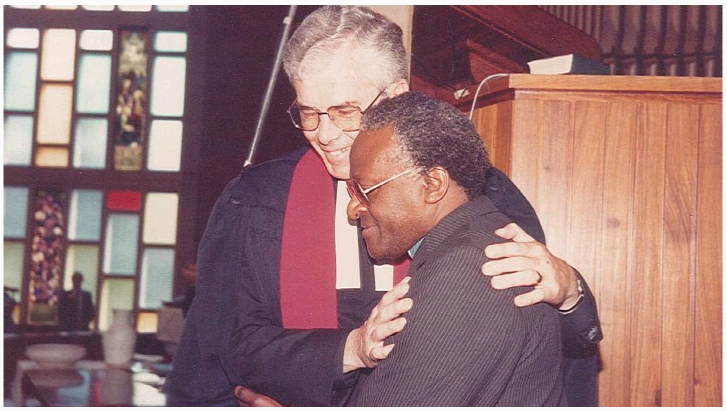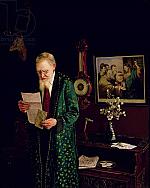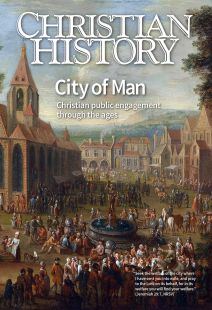Doing church, being church

[Methodist Bishop Peter J. Storey with Anglican Archbishop Desmond Tutu—Courtesy of Peter J. Storey]
We spoke with Bishop Peter J. Storey, former president of the Methodist Church of Southern Africa and of the South African Council of Churches. Now W. Ruth and A. Morris Williams Distinguished Professor Emeritus of the Practice of Christian Ministry at Duke Divinity School, he worked in the anti-apartheid struggle for 40 years.
CH: Talk about what it means to be an incarnational, engaged church.
Peter Storey: The church is only the church when it is engaging the world. The rest of the time it’s just getting dressed for the job. Doing church is simply preparation for being church. We need to become comfortable with being uncomfortable in the public square. It’s not that we don’t belong there. We have every right to be there. But we are partly foreigners.
Three or four years ago at the top of Adderley Street in Cape Town, we dedicated a beautiful wooden arch commemorating Archbishop Desmond Tutu (b. 1931). On one side there is St. George’s Anglican Cathedral. On the other side are the houses of Parliament. The arch is at the spot where on the 29th of February 1988 more than a hundred clergy marched from the cathedral to confront Parliament; marching from the place where people listened for God to confront the place where people play God. We were called to minister, not only to personal needs, but to the character of the nation.
We can’t do this unless we first know who we are. Christians bring to the table not so much a different set of propositions, but a different citizenship. Our ideas might be original, they may be interesting, they may be worth debating. But what is not debatable is that each of us, if we are Christians, has a dual citizenship.
I have an identity document which says I’m a citizen of the Republic of South Africa by birth. It’s important and precious to me. But I have another certificate that says I’m a citizen of the Kingdom of God by baptism. The real issue is which one takes precedence. We are required by Jesus to render to God our first allegiance.
When I go to worship the one true God, I’m actually visiting my “other land.” And I come back to the country I live in, and I see the differences. When Jesus says the kingdom of heaven is like this or like that, he’s not suggesting that one day you might get to a place where things are like this; he is saying that’s what this world can be like.
CH: How should the church engage?
PS: First, you have to be fearless for the truth; believe that the truth is God’s ultimately irresistible weapon in engaging the powers and unmasking the lies.
Second, bind up the broken; identify with the least and the lowest and those who are being marginalized. It sounds easier than it is. I once met German bishop Kurt Scharf (1902–1990), one of the confessing church clergy with Bonhoeffer, imprisoned by Hitler. When the Russians came, he was imprisoned by the Russians. When he got to the West, he became persona non grata with the West German government. I asked him, “What kind of advice have you got to give somebody who lives in a country not very different from Hitler’s Germany?”
He said, “Pray for those who are being made to suffer by the regime.” I said, “I do that.” He said, “You need to pray for them by name.” I said, “Yes we do that.” Then, he said, “You must go to those for whom you pray.” I said, “And then?” “Oh,” he replied, “suffer.” Pastoral care can be very, very dangerous. Be careful who you care for as a church because you’re going to get into trouble.
Third, “live the alternative.” Every congregation I ministered to needed to become an alternative South Africa. I couldn’t preach with integrity to a congregation of one race. Whether in District Six, traditionally a community of people of color, or the Central Methodist Mission in Johannesburg, traditionally an upmarket white congregation, my job was to transform them into a more accurate picture of the South Africa God wanted by integrating the congregation. And that meant trouble.
But if you stick with it, the church becomes a laboratory, a test tube, a picture of God’s future. It becomes a challenge to the powers by its very existence—in our case the very existence of an integrated congregation of people living and loving. The power of just being an alternative community must not be underestimated.
Finally, be part of the energy of change. Change would not have come in my country if the church had not been willing to work with others. It doesn’t mean you get absorbed. You bring to the table who you are, and that will sometimes act as a challenge to methods of change being considered—particularly violence. You go on a dangerous journey by entering that energy for change, but you go there trusting God.
By Peter Storey and the editors
[Christian History originally published this article in Christian History Issue #141 in 2021]
Peter J. Storey, former president of the Methodist Church of Southern Africa and of the South African Council of Churches is now W. Ruth and A. Morris Williams Distinguished Professor Emeritus of the Practice of Christian Ministry at Duke Divinity School.Next articles
Organizing for engagement
A small sampling of Christian organizations and movements through the centuries that promoted civic engagement in different spheres for the common good
Jennifer Woodruff TaitCity of Man: Recommended resources
learn more about christian civic engagement through these suggestions compiled by our editors and contributors.
The editors and contributorsSupport us
Christian History Institute (CHI) is a non-profit Pennsylvania corporation founded in 1982. Your donations support the continuation of this ministry
Donate







